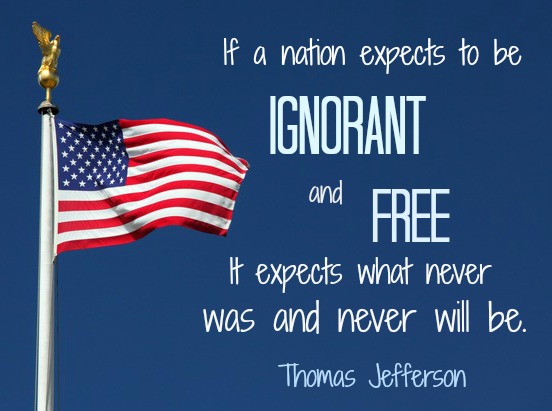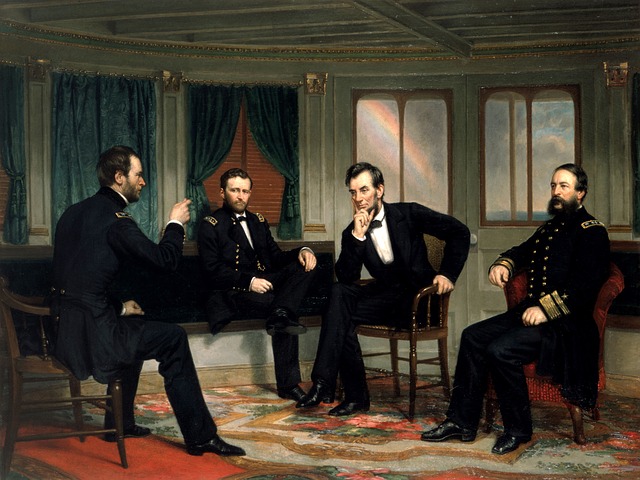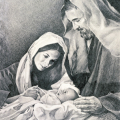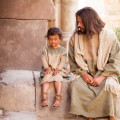A century ago, America as a nation trusted in God—and Americans proclaimed their trust in the money they minted. With every purchase made, Americans said, “In God We Trust.” Our presidents and other civic leaders encouraged us to remember the source of our blessings—Almighty God. God’s name was treated with reverence and respect. And we acknowledged His role in our country and in our lives.
It’s amazing how far we’ve come in America today—but how much we’ve lost along the way. We have satellites and smart phones, computers the size of a wallet. We have vast quantities of information at our fingertips—and we don’t even have to push buttons any more, we just tap a screen. But with all of our man-made brilliance, have we forgotten the source of our genius and inspiration? America was built by a God-fearing people who were guided by His Hand in all things—from the discovery of the land to the creation of the U.S. Constitution and the establishment of the government. Do we still fear God, or do we fear the retribution of those who don’t believe Him? Do we praise God, or take His name in vain? Where is God in America today?
God’s Hand in the Birth of our Nation
God’s hand was in the establishment of the United States of America. In The Church of Jesus Christ of Latter-day Saints, modern prophets of God have testified this is true. So have those whose blood, sweat and tears laid the foundation of our government and our nation. America’s Founding Fathers saw God’s hand in their work. Elder Dallin H. Oaks discussed the miracle of the U.S. Constitution:
The thirteen colonies and three and one-half million Americans who had won independence from the British crown a few years earlier were badly divided on many fundamental issues. … Unless America could adopt a central government with sufficient authority to function as a nation, the thirteen states would remain a group of insignificant, feuding little nations united by nothing more than geography and forever vulnerable to the impositions of aggressive foreign powers. No wonder the first purpose stated in the preamble of the new United States Constitution was “to form a more perfect union.” …
Instead of reacting timidly because of disunity and weakness, the delegates boldly ignored the terms of their invitation to amend the Articles of Confederation and instead set out to write an entirely new constitution. They were conscious of their place in history. For millennia the world’s people had been ruled by kings or tyrants. Now a group of colonies had won independence from a king and their representatives had the unique opportunity of establishing a constitutional government Abraham Lincoln would later describe as “of the people, by the people, and for the people.” …
It is remarkable that the delegates were able to put aside their narrow sectional loyalties to agree on a strong central government. Timely events were persuasive of the need: the delegates’ memories of the national humiliation when Congress was chased out of Philadelphia by a mob, the recent challenge of Shay’s rebellion against Massachusetts farm foreclosures, and the frightening prospect that northern and western areas would be drawn back into the orbit of European power.
The success of the convention was attributable in large part to the remarkable intelligence, wisdom, and unselfishness of the delegates.
In The Doctrine and Covenants, a book of revelations to modern prophets in The Church of Jesus Christ, the Lord said that He “established the Constitution of this land, by the hands of wise men whom I raised up unto this very purpose” (Doctrine & Covenants 101:80). The very framers of our Constitution were guided by the Lord—and raised up by Him for this very reason.
U.S. Constitution Created for a God-Fearing People
The Founding Fathers not only acknowledged God in all things—they expected Americans to do the same. John Adams, one of our Founding Fathers, said, “Our Constitution was made only for a moral and religious people. It is wholly inadequate to the government of any other.” (The Works of John Adams, ed. C. F. Adams, Boston: Little, Brown Co., 1851, 4:31)
During his inaugural address in 1789, George Washington—the first president of the new United States of America—said:
No people can be bound to acknowledge and adore the invisible hand, which conducts the affairs of men, more than the people of the United States. Every step by which they have advanced to the character of an independent nation seems to have been distinguished by some token of providential agency (First Inaugural Address, 30 Apr. 1789).
The Founding Fathers weren’t the only ones who took notice of America’s God-fearing people. In 1831, the French historian Alexis de Tocqueville said:
I sought for the greatness and genius of America in her commodious harbors and her ample rivers, and it was not there; in her fertile fields and boundless prairies, and it was not there; in her rich mines and her vast world of commerce, and it was not there. Not until I went to the churches of America and heard her pulpits aflame with righteousness did I understand the secret of her genius and power. America is great because she is good, and if America ever ceases to be good, America will cease to be great. (Jerreld L. Newquist, comp., Prophets, Principles and National Survival, Salt Lake City: Publishers Press, 1967, p. 60.)
The Book of Mormon teaches:
For behold, this is a land which is choice above all other lands… and whatsoever nation shall possess it shall be free from bondage, and from captivity, and from all other nations under heaven, if they will but serve the God of the land, who is Jesus Christ (Ether 2:10, 12).
In America’s infancy, her occupants firmly believed in the Almighty God, that He was not only watching them but He was watching over them. And the scriptures teach us that this is indeed true.
God in Lincoln’s America
Abraham Lincoln, America’s 16th president, officially set aside the last Thursday in November as a “day of Thanksgiving and Praise.” His Thanksgiving Proclamation states:
The year that is drawing towards its close, has been filled with the blessings of fruitful fields and healthful skies. To these bounties, which are so constantly enjoyed that we are prone to forget the source from which they come, others have been added, which are of so extraordinary a nature, that they cannot fail to penetrate and soften even the heart which is habitually insensible to the ever watchful providence of Almighty God. In the midst of a civil war of unequaled magnitude and severity, … peace has been preserved with all nations, order has been maintained, the laws have been respected and obeyed, and harmony has prevailed everywhere except in the theatre of military conflict…. Needful diversions of wealth and of strength from the fields of peaceful industry to the national defence, have not arrested the plough, the shuttle or the ship; the axe has enlarged the borders of our settlements, and the mines, as well of iron and coal as of the precious metals, have yielded even more abundantly than heretofore. Population has steadily increased, notwithstanding the waste that has been made in the camp, the siege and the battle-field; and the country, rejoicing in the consiousness of augmented strength and vigor, is permitted to expect continuance of years with large increase of freedom. No human counsel hath devised nor hath any mortal hand worked out these great things. They are the gracious gifts of the Most High God, who, while dealing with us in anger for our sins, hath nevertheless remembered mercy. It has seemed to me fit and proper that they should be solemnly, reverently and gratefully acknowledged as with one heart and one voice by the whole American People. I do therefore invite my fellow citizens in every part of the United States, and also those who are at sea and those who are sojourning in foreign lands, to set apart and observe the last Thursday of November next, as a day of Thanksgiving and Praise to our beneficent Father who dwelleth in the Heavens. And I recommend to them that while offering up the ascriptions justly due to Him for such singular deliverances and blessings, they do also, with humble penitence for our national perverseness and disobedience, commend to His tender care all those who have become widows, orphans, mourners or sufferers in the lamentable civil strife in which we are unavoidably engaged, and fervently implore the interposition of the Almighty Hand to heal the wounds of the nation and to restore it as soon as may be consistent with the Divine purposes to the full enjoyment of peace, harmony, tranquillity and Union.
Even in the midst of the American Civil War—in which brother fought against brother, and father against son and American against American—Lincoln encouraged Americans to remember the Almighty God and thank Him for their blessings.
Where is God Today?
But where is God in America today? Could we expect such an eloquent speech reminding us to thank God and remember that He is the source of our blessings from our current president? In Lincoln’s time, religion was woven tightly into the fabric of America. Americans knew that God was the source of their greatness and power. President Thomas S. Monson said:
The revered Abraham Lincoln accurately described our plight: “We have been the recipients of the choicest bounties of Heaven; we have been preserved these many years in peace and prosperity; we have grown in numbers, wealth, and power. … But we have forgotten God. We have forgotten the gracious hand which preserved us in peace and multiplied and enriched and strengthened us, and we have vainly imagined, in the deceitfulness of our hearts, that all these blessings were produced by some superior wisdom and virtue of our own. Intoxicated with unbroken success, we have become too self-sufficient to feel the necessity of redeeming and preserving grace, too proud to pray to the God that made us.”
More than a century ago, Lincoln was concerned about people forgetting to pray to God and thank Him for His bounty. What would Lincoln say about God in today’s world—where he would be more likely to hear the Lord’s name taken in vain than in prayer and supplication or thanksgiving? President Monson said:
I’ve lived long enough to have witnessed much of the metamorphosis of society’s morals. Where once the standards of the Church and the standards of society were mostly compatible, now there is a wide chasm between us, and it’s growing ever wider.
Many movies and television shows portray behavior which is in direct opposition to the laws of God. … The lyrics in much of today’s music fall in the same category. The profanity so prevalent around us today would never have been tolerated in the not-too-distant past. Sadly, the Lord’s name is taken in vain over and over again.
How quickly we forget the Lord our God. President Henry B. Eyring said:
… Forgetting God has been … a persistent problem among His children since the world began. Think of the times of Moses, when God provided manna and in miraculous and visible ways led and protected His children. Still, the prophet warned the people who had been so blessed, as prophets always have warned and always will: “Take heed to thyself, and keep thy soul diligently, lest thou forget the things which thine eyes have seen, and lest they depart from thy heart all the days of thy life.”
And the challenge to remember has always been the hardest for those who are blessed abundantly. Those who are faithful to God are protected and prospered. That comes as the result of serving God and keeping His commandments. But with those blessings comes the temptation to forget their source. It is easy to begin to feel the blessings were granted not by a loving God on whom we depend but by our own powers.
God’s hand has been over America—from the discovery of a new land to the birth of a new nation. As that nation has grown and developed, God has continued to protect and watch over our nation. But it is not only for our benefit that God has watched over us—our Constitution has been a standard for the world since its inception. Elder Oaks said in 1992:
The United States Constitution was the first written constitution in the world. It has served Americans well, enhancing freedom and prosperity during the changed conditions of more than two hundred years. Frequently copied, it has become the United States’ most important export. After two centuries, every nation in the world except six have adopted written constitutions, and the U.S. Constitution was a model for all of them.
Slowly, those who don’t believe in God and are fighting against Him are trying to take His name out of the public eye—even as they use His name in vain. The moral fabric of society will only unravel as much as its citizens will allow. Those who still believe in God must fight for their right to stand up in His defense.
God is still watching over America and her inhabitants today. But we need to remember that our greatness doesn’t lie in Silicon Valley or in our nuclear weapons. Not in our space travel nor or so-called “equal rights.” America’s greatness lies in our righteousness. Our commitment to serve the God of this land—who is the Savior, Jesus Christ. And, like de Tocqueville said, we will lose our greatness if we lose our goodness.








